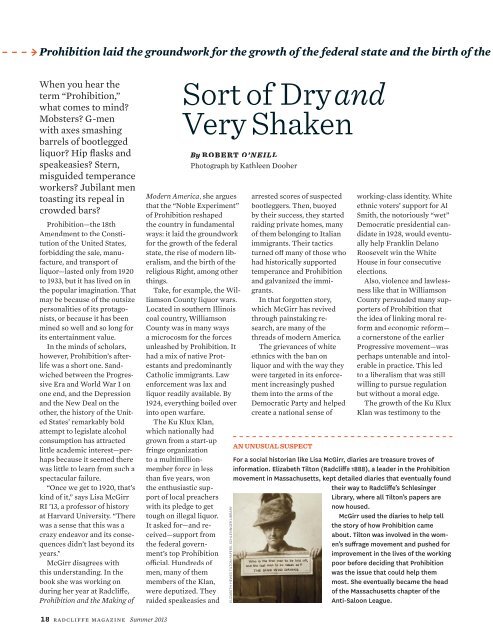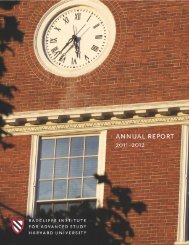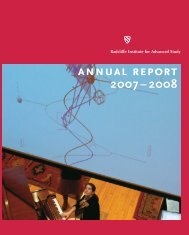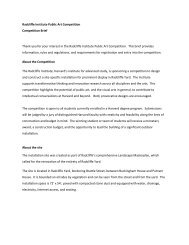Download - Radcliffe Institute for Advanced Study - Harvard University
Download - Radcliffe Institute for Advanced Study - Harvard University
Download - Radcliffe Institute for Advanced Study - Harvard University
You also want an ePaper? Increase the reach of your titles
YUMPU automatically turns print PDFs into web optimized ePapers that Google loves.
Prohibition laid the groundwork <strong>for</strong> the growth of the federal state and the birth of the<br />
When you hear the<br />
term “Prohibition,”<br />
what comes to mind<br />
Mobsters G-men<br />
with axes smashing<br />
barrels of bootlegged<br />
liquor Hip flasks and<br />
speakeasies Stern,<br />
misguided temperance<br />
workers Jubilant men<br />
toasting its repeal in<br />
crowded bars<br />
Prohibition—the 18th<br />
Amendment to the Constitution<br />
of the United States,<br />
<strong>for</strong>bidding the sale, manufacture,<br />
and transport of<br />
liquor—lasted only from 1920<br />
to 1933, but it has lived on in<br />
the popular imagination. That<br />
may be because of the outsize<br />
personalities of its protagonists,<br />
or because it has been<br />
mined so well and so long <strong>for</strong><br />
its entertainment value.<br />
In the minds of scholars,<br />
however, Prohibition’s afterlife<br />
was a short one. Sandwiched<br />
between the Progressive<br />
Era and World War I on<br />
one end, and the Depression<br />
and the New Deal on the<br />
other, the history of the United<br />
States’ remarkably bold<br />
attempt to legislate alcohol<br />
consumption has attracted<br />
little academic interest—perhaps<br />
because it seemed there<br />
was little to learn from such a<br />
spectacular failure.<br />
“Once we get to 1920, that’s<br />
kind of it,” says Lisa McGirr<br />
RI ’13, a professor of history<br />
at <strong>Harvard</strong> <strong>University</strong>. “There<br />
was a sense that this was a<br />
crazy endeavor and its consequences<br />
didn’t last beyond its<br />
years.”<br />
McGirr disagrees with<br />
this understanding. In the<br />
book she was working on<br />
during her year at <strong>Radcliffe</strong>,<br />
Prohibition and the Making of<br />
Sort of Dry and<br />
Very Shaken<br />
By ROBERT O ’NEILL<br />
Photograph by Kathleen Dooher<br />
Modern America, she argues<br />
that the “Noble Experiment”<br />
of Prohibition reshaped<br />
the country in fundamental<br />
ways: it laid the groundwork<br />
<strong>for</strong> the growth of the federal<br />
state, the rise of modern liberalism,<br />
and the birth of the<br />
religious Right, among other<br />
things.<br />
Take, <strong>for</strong> example, the Williamson<br />
County liquor wars.<br />
Located in southern Illinois<br />
coal country, Williamson<br />
County was in many ways<br />
a microcosm <strong>for</strong> the <strong>for</strong>ces<br />
unleashed by Prohibition. It<br />
had a mix of native Protestants<br />
and predominantly<br />
Catholic immigrants. Law<br />
en<strong>for</strong>cement was lax and<br />
liquor readily available. By<br />
1924, everything boiled over<br />
into open warfare.<br />
The Ku Klux Klan,<br />
which nationally had<br />
grown from a start-up<br />
fringe organization<br />
to a multimillionmember<br />
<strong>for</strong>ce in less<br />
than five years, won<br />
the enthusiastic support<br />
of local preachers<br />
with its pledge to get<br />
tough on illegal liquor.<br />
It asked <strong>for</strong>—and received—support<br />
from<br />
the federal government’s<br />
top Prohibition<br />
official. Hundreds of<br />
men, many of them<br />
members of the Klan,<br />
were deputized. They<br />
raided speakeasies and<br />
ELIZABETH HEWES TILTON PAPERS, SCHLESINGER LIBRARY<br />
arrested scores of suspected<br />
bootleggers. Then, buoyed<br />
by their success, they started<br />
raiding private homes, many<br />
of them belonging to Italian<br />
immigrants. Their tactics<br />
turned off many of those who<br />
had historically supported<br />
temperance and Prohibition<br />
and galvanized the immigrants.<br />
In that <strong>for</strong>gotten story,<br />
which McGirr has revived<br />
through painstaking research,<br />
are many of the<br />
threads of modern America.<br />
The grievances of white<br />
ethnics with the ban on<br />
liquor and with the way they<br />
were targeted in its en<strong>for</strong>cement<br />
increasingly pushed<br />
them into the arms of the<br />
Democratic Party and helped<br />
create a national sense of<br />
AN UNUSUAL SUSPECT<br />
working-class identity. White<br />
ethnic voters’ support <strong>for</strong> Al<br />
Smith, the notoriously “wet”<br />
Democratic presidential candidate<br />
in 1928, would eventually<br />
help Franklin Delano<br />
Roosevelt win the White<br />
House in four consecutive<br />
elections.<br />
Also, violence and lawlessness<br />
like that in Williamson<br />
County persuaded many supporters<br />
of Prohibition that<br />
the idea of linking moral re<strong>for</strong>m<br />
and economic re<strong>for</strong>m—<br />
a cornerstone of the earlier<br />
Progressive movement—was<br />
perhaps untenable and intolerable<br />
in practice. This led<br />
to a liberalism that was still<br />
willing to pursue regulation<br />
but without a moral edge.<br />
The growth of the Ku Klux<br />
Klan was testimony to the<br />
For a social historian like Lisa McGirr, diaries are treasure troves of<br />
in<strong>for</strong>mation. Elizabeth Tilton (<strong>Radcliffe</strong> 1888), a leader in the Prohibition<br />
movement in Massachusetts, kept detailed diaries that eventually found<br />
their way to <strong>Radcliffe</strong>’s Schlesinger<br />
Library, where all Tilton’s papers are<br />
now housed.<br />
McGirr used the diaries to help tell<br />
the story of how Prohibition came<br />
about. Tilton was involved in the women’s<br />
suffrage movement and pushed <strong>for</strong><br />
improvement in the lives of the working<br />
poor be<strong>for</strong>e deciding that Prohibition<br />
was the issue that could help them<br />
most. She eventually became the head<br />
of the Massachusetts chapter of the<br />
Anti-Saloon League.<br />
18 radcliffe magazine Summer 2013
















